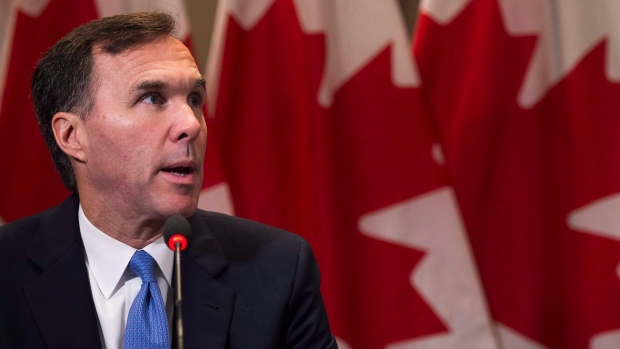May 31, 2017
Liberals close to hiring Canada infrastructure bank chair amid political firestorm

The Liberal government has begun booking interviews with candidates hoping to be the first chair of Canada's new infrastructure bank, which has already emerged as a lightning rod for controversy before it even opens for business.
BNN has learned more than a half dozen women and men are now being considered for the high profile position. The front runner candidates are said to have diverse leadership backgrounds and board experience. An announcement regarding the selected candidate could be made by the end of June, according to two people with direct knowledge of the matter.
“Moving forward with the interview process, and bringing in some outside help to get the nuts and bolts in place does suggest that the government is taking its commitment seriously,” Brian DePratto, senior economist at TD Bank Group, told BNN in an email.
A number of stakeholders have a say in the chairperson selection process, including the Privy Council Office, Infrastructure Minister Amarjeet Sohi and Finance Minister Bill Morneau. Prime Minister Justin Trudeau has also appointed advisors to help with the bank's creation, including former Ontario Teachers' Pension Plan CEO Jim Leech.
Sohi’s office confirmed the hiring process is underway, but reiterated no hiring can take place before legislation for the bank makes its way through Parliament. A Finance Department spokesperson declined to comment.
The government has committed to launching the infrastructure bank by the end of the year, despite a political firestorm that has threatened to derail its rollout. NDP Infrastructure Critic Matthew Dubé recently accused the government of rushing the bank’s creation to please “Bay Street friends.”
"The government clearly wants to have something called an ‘infrastructure bank’ up and running as soon as possible,” C.D. Howe Institute CEO William Robson told BNN in an email. “But we seem to be getting many operational aspects before we have clear big-picture answers about the organization’s mandate and scope. Form should follow function, so this looks a bit backward.”
Legislation for the bank is included in Morneau’s budget bill, C-44. A best-case scenario for the Liberal government would see that bill passed by the end of June, setting the stage to possibly launch the bank as early as November. The government cannot officially appoint a chairperson until legislation passes.
The bank’s mandate is to invest $35 billion to help fund massive infrastructure projects in Canada by attracting large institutions from around the world as partner investors. Its goal is to leverage up to five dollars in private money for each dollar the federal government puts in.
On Wednesday, the International Monetary Fund described the bank as a “cornerstone of the government’s growth strategy,” saying it will be an effective tool in helping to fuel Canada’s economy. The IMF also called on the government to better educate all stakeholders on the potential benefits from the bank.
“The federal government has to work with the provinces, has to work with municipalities in order to create opportunities that are interesting for institutional capital like us,” Mark Machin, president and CEO of the Canada Pension Plan Investment Board, recently told BNN in a television interview. “That’s really complicated to do so you need a pool of expertise, a pool of people who can actually understand that, do the groundwork, prepare the opportunities and maybe provide some financing around it as well.”
The selection process for the bank’s first chairperson comes roughly two weeks after the government stopped accepting applications for the position. If bill C-44 passes, it would open the door to hire both the chairperson and the bank’s board of directors, which is expected to include between 8 and 11 directors. The chair will play a key role in selecting the bank’s CEO.
“What is important is that the infrastructure bank has the independence to hire the best talent and empower them to rigorously evaluate projects … free from political interference,” Tiff Macklem, a former senior deputy governor at the Bank of Canada and current dean of the Rotman School of Management, told BNN in an email.
As BNN previously reported, the government is working with executive search firm Odgers Berndtson to find candidates from around the world. “The CEO will have to run the bank, write out a plan, hire people, create the right culture which will be so important,” Leech told BNN in a recent television interview. “There’s a lot of work to be done.”
BNN has also learned consulting firm Deloitte has been selected, subject to parliamentary approval of the legislation, to help the government get the bank off the ground, assisting with a range of setup issues, like back office and IT systems support. Deloitte Spokesperson Tonya Johnson said the company's policies "prohibit us from discussing any information about clients or the work that we do for them."
The bank is expected to eventually employ between 50-100 people, a staffing level that would resemble what is typically seen at an investment bank or merchant bank that focuses on financing and deal-making.
